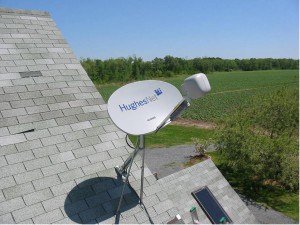“Broadband is a highly competitive industry in the United States, with many options for customers.”
Despite that mantra from the cable and telephone industry, large sections of the country have two options for broadband service – satellite or nothing. For an estimated 80,000 Californians, nothing may be a better option. That number represents the estimated number of state residents locked into a contract with HughesNet for satellite-delivered “broadband” service. For several years, many customers have been appalled at just how bad HughesNet is at delivering that service, and now several have had enough.
 Filed in the Northern District of California federal court in Oakland, a class action lawsuit alleges that HughesNet falsely advertises the quality of its service, particularly regarding speeds it promises but doesn’t deliver, and does not disclose the full extent of the company’s throttling and cap policies.
Filed in the Northern District of California federal court in Oakland, a class action lawsuit alleges that HughesNet falsely advertises the quality of its service, particularly regarding speeds it promises but doesn’t deliver, and does not disclose the full extent of the company’s throttling and cap policies.
HughesNet limits customers to a daily limit starting at just 200MB of consumption, and then throttles speed to dial-up or slower for at least 24 hours for anyone who exceeds it. Repeated instances of exceeding the cap extends a customer’s time in the throttled speed penalty box or can lead to service suspension.
Customers who find they no longer wish to live under this kind of “broadband regime” find escaping the two year service contract expensive, requiring a $400 early cancellation fee.
For millions of Americans, well beyond cable lines or too far away for DSL service, broadband under any terms is an extremely expensive proposition. HughesNet requires customers to purchase equipment, costing around $300 up front (after a $100 mail-in rebate), including mandatory installation fees. For just 1.0Mbps service, the monthly cost is around $60 with a 200MB daily limit. If you want to attempt service at 5Mbps, that will cost $350 a month with a 500MB daily limit.
For HughesNet customers Tina Walker and Christoper Bayless, who instigated the class action suit, even pricing this high wasn’t the reason for filing the suit on behalf of California residents. It is because speeds promised are speeds rarely delivered. Many independent reviews of the service agree, with many finding download speeds at 200-300Kbps more typical.
Walker and Bayless also allege the company throttles more than the “few” customers HughesNet claims exceed the daily limits.
By the time customers decide they’ve had enough, they have to spend several hundred dollars to get away from the company, and many are also stuck with useless equipment they had to buy up front.
They are asking for a refund of any early cancellation fees paid in California, an end to the policy that charges them, and more truthful disclosure about the actual level of service HughesNet is capable of providing.
HughesNet defends their service, pointing to a 30 day window for customers to sample the service and decide whether it is right for them, and having the option to cancel during that window with no early termination fee. Customers are still out the initial investment for equipment and installation, however. The company does claim that many customers can return their HughesNet equipment and receive a $200 discount off their early termination fee, if they qualify.
But the company also charges an early termination fee for customers it throws off their network. If you exceed their usage limits too often, they can cancel service and immediately charge your credit or debit card a $400 fee. If you agree to return the equipment, they will refund $300 of that fee, charging you $100 for making them get rid of you as a customer.
Beyond that, HughesNet does not comment on the specific merits of any lawsuit filed against it.
For rural Americans, any concept of “broadband” service is slow and expensive, with long term contracts, usage caps, and in some cases, expensive overlimit fees. The three satellite competitors in the United States all require term commitments, and sell their least expensive broadband service at prices urban and suburban residents pay for the fastest levels of service:
StarBand: $299 equipment fee/$50 installation 1Mbps service $69.99/mo – $79.99/mo (1-2 year commitment) — 1,600MB download/400MB upload 7-day rolling limit
Wildblue: $150 equipment fee/$50 installation 512kbps service $49.99/mo (1 year commitment) — 7,500MB download/2,300MB upload 30-day rolling limit
HughesNet: $299 equipment & installation fee, after rebate 1Mbps service $59.99/mo (2 year commitment) — 200MB daily download limit


 Subscribe
Subscribe


